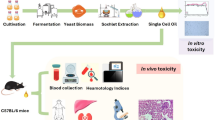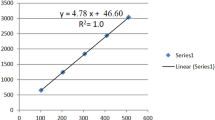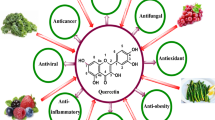Abstract
Found in humid regions and waterways and popularly used to treat gastrointestinal problems among other applications, the present study evaluated the M. aquatica essential oil (OEMa) as a therapeutic alternative to treat gastrointestinal disorders. Produced by steam distillation, chemical composition of OEMa was determined by GC–MS analysis. The ethanol-induced ulcer and the dose-repeated acetylsalicylic acid (ASA)-induced gastrointestinal lesions models in rats evaluated, respectively, the prophylactic and curative effects of EOMa on peptic ulcers. The EOMa’s effect on gastric secretion, gastric mucus and gastrointestinal motility were evaluated in in vivo models. The curative effect of EOMa on acute colitis was evaluated using the DSS-induced colitis model in mice. Obtained in 0.17% yield (w/w), with carvone (54.82 ± 1.39 g/100 g oil) as the main constituent, EOMa (at 75 mg/kg) showed potent gastroprotective effect (> 90%) mediated by non-protein sulfhydryl compounds (NPSH) and nitric oxide (NO) modulation alongside reduction in gastric secretion volume and total acidity. EOMa did not affect gastric mucus production and gastrointestinal motility. In dose-repeated ASA-induced gastrointestinal lesions model, EOMa (at 25 mg/kg) promoted the inflammatory process resolution both in gastric and duodenal walls by modulating NPSH, NO and myeloperoxidase levels. Despite delaying in 2 days the clinical symptoms worsening, EOMa (at 25 mg/kg) was not able to protect colon tissues from DSS-induced acute colitis as evidenced by macroscopic, biochemical, and histopathological parameters. This is the first report of Mentha aquatica essential oil as a promising herbal medicine for peptic ulcers treatment together with an adjuvant effect in IBD.




Similar content being viewed by others
Data availability
The datasets generated during the current study are available from the corresponding author on reasonable request.
Abbreviations
- ASA:
-
Acetylsalicylic acid
- CMC:
-
Carboxymethylcellulose
- COX:
-
Cicloxigenase
- DAI:
-
Disease activity index
- DSS:
-
Dextran sulfate sodium
- DTNB:
-
5,5'-Ditiobis-(2-nitrobenzoic acid)
- EDTA:
-
Ethylenediamine tetra-acetic acid
- EOMa:
-
Essential oil of Mentha aquatica
- GSH:
-
Glutathione
- IBD:
-
Inflammatory bowel disease
- l-NAME:
-
N-Nitro-l-arginine
- MPO:
-
Myeloperoxidase
- NEM:
-
N-Ethylmaleimide
- NO:
-
Nitric oxide
- NPSH:
-
Non-protein sulfhydryl compounds
- NSAID:
-
Non-steroidal anti-inflammatory drug
- PBS:
-
Phosphate-buffered saline
- PG:
-
Prostaglandin
- ROS:
-
Reactive oxygen species
- TCA:
-
Trichloroacetic acid
- UC:
-
Ulcerative colitis
References
Adams RP (2007) Identification of essential oil components by gas chromatography/mass spectrometry, 4.1. Allured Publishing Corporation, Illinois
Asadollah-Pour F, Jokar A, Nasiri E et al (2021) A comprehensive review on the ethnobotany, phytochemistry, pharmacology, and toxicology of Mentha aquatica L (water mint) as a wild shallow vegetable. Curr Pharm Des 27:2615–2627. https://doi.org/10.2174/1381612827666210219154751
Bialkowska AB, Ghaleb AM, Nandan MO, Yang VW (2016) Improved Swiss-rolling technique for intestinal tissue preparation for immunohistochemical and immunofluorescent analyses. J vis Exp 113:e54161. https://doi.org/10.3791/54161
Bradley PP, Priebat DA, Christensen RD, Rothstein G (1982) Measurement of cutaneous inflammation: estimation of neutrophil content with an enzyme marker. J Invest Dermatol 78:206–209. https://doi.org/10.1111/1523-1747.ep12506462
Bristy TA, Barua N, Montakim Tareq A et al (2020) Deciphering the pharmacological properties of methanol extract of Psychotria calocarpa leaves by in vivo, in vitro and in silico approaches. Pharmaceuticals 13(8):183. https://doi.org/10.3390/ph13080183
Chassaing B, Aitken JD, Malleshappa M, Vijay-Kumar M (2014) Dextran sulfate sodium (DSS)-induced colitis in mice. Curr Protoc Immunol 104:15.25.1-15.25.14. https://doi.org/10.1002/0471142735.im1525s104
Cho CH, Ogle CW (1992) The pharmacological differences and similarities between stress- and ethanol-induced gastric mucosal damage. Life Sci 51:1833–1842. https://doi.org/10.1016/0024-3205(92)90034-m
Da Silva GG, Braga LEO, de Oliveira ECS et al (2021) Cashew apple byproduct: gastroprotective effects of standardized extract. J Ethnopharmacol 269:113744. https://doi.org/10.1016/j.jep.2020.113744
Gajendran M, Loganathan P, Jimenez G et al (2019) A comprehensive review and update on ulcerative colitis. Dis Mon 65:100851. https://doi.org/10.1016/j.disamonth.2019.02.004
Gonzalez AC, Costa TF, Andrade ZA, Medrado AR (2016) Wound healing—a literature review. An Bras Dermatol 91:614–620. https://doi.org/10.1590/abd1806-4841.20164741
Khan AA, Alsahli MA, Rahmani AH (2018) Myeloperoxidase as an active disease biomarker: recent biochemical and pathological perspectives. Med Sci 6:33. https://doi.org/10.3390/medsci6020033
Kim YS, Kim JW, Ha NY et al (2020) Herbal therapies in functional gastrointestinal disorders: a narrative review and clinical implication. Front Psychiatry 11:601. https://doi.org/10.3389/fpsyt.2020.00601
Kuna L, Jakab J, Smolic R et al (2019) Peptic ulcer disease: a brief review of conventional therapy and herbal treatment options. J Clin Med 8:179. https://doi.org/10.3390/jcm8020179
Laine L, Takeuchi K, Tarnawski A (2008) Gastric mucosal defense and cytoprotection: bench to bedside. Gastroenterology 135:41–60. https://doi.org/10.1053/j.gastro.2008.05.030
Li WF, Hao DJ, Fan T et al (2014) Protective effect of chelerythrine against ethanol-induced gastric ulcer in mice. Chem Biol Interact 208:18–27. https://doi.org/10.1016/j.cbi.2013.11.011
Monks A, Scudiero D, Skehan P et al (1991) Feasibility of a high-flux anticancer drug screen using a diverse panel of cultured human tumor cell lines. J Natl Cancer Inst 83(11):757–766. https://doi.org/10.1093/jnci/83.11.757
Monteiro KM, Spindola HM, Possenti A et al (2013) Characterization of a refinement of the “pylorus ligation” model of rat gastric ulceration resulting in “no pain” and a more specific pharmacological response. J Pharmacol Toxicol Methods 67:121–128. https://doi.org/10.1016/j.vascn.2012.09.002
Nair AB, Jacob S (2016) A simple practice guide for dose conversion between animals and human. J Basic Clin Pharma 7(2):27–31. https://doi.org/10.4103/0976-0105.177703
Possenti A, de Carvalho JE, Monteiro KM et al (2012) Efeito de fermentado (utilizado como alimento funcional) sobre: a citoproteção gástrica, atividade anti-secretória e a motilidade intestinal em animais. Int J Nutrol 05:35–41. https://doi.org/10.1055/s-0040-1701426
Rahimifard N, Hajimehdipoor H, Hedayati MH et al. (2010) Cytotoxic effects of essential oils and extracts of some Mentha species on Vero, Hela and Hep2 cell lines. J Med Plants 9(35):88–92. https://jmp.ir/article-1-270-en.pdf
Rozza AL, Hiruma-Lima CA, Takahira RK, Padovani CR, Pellizzon CH (2013) Effect of menthol in experimentally induced ulcers: pathways of gastroprotection. Chem Biol Interact 206(2):272–278. https://doi.org/10.1016/j.cbi.2013.10.003
Salehi B, Stojanović-Radić Z, Matejić J et al (2018) Plants of genus Mentha: from farm to food factory. Plants 7:70. https://doi.org/10.3390/plants7030070
Schubert ML (2015) Functional anatomy and physiology of gastric secretion. Curr Opin Gastroenterol 31:479–485. https://doi.org/10.1097/MOG.0000000000000213
Sharma JN, Al-Omran A, Parvathy SS (2007) Role of nitric oxide in inflammatory diseases. Inflammopharmacology 15:252–259. https://doi.org/10.1007/s10787-007-0013-x
Silva CMS, Wanderley CWS, Lima-Junior FJB et al (2015) Carvone (R)-(–) and (S)-(+) enantiomers inhibits upper gastrointestinal motility in mice. Flavour Fragr J 30:439–444. https://doi.org/10.1002/ffj.3267
Souza FV, da Rocha MB, de Souza DP, Marçal RM (2013) (–)-Carvone: antispasmodic effect and mode of action. Fitoterapia 85:20–24. https://doi.org/10.1016/j.fitote.2012.10.012
Stokes WS, Casati S, Strickland J, Paris M (2008) Neutral red uptake cytotoxicity tests for estimating starting doses for acute oral toxicity tests. Curr Protoc Toxicol. https://doi.org/10.1002/0471140856.tx2004s36 (Chapter 20, Unit 20.4)
Tanveer M, Wagner C, Ul-Haq MI et al (2020) Spicing up gastrointestinal health with dietary essential oils. Phytochem Rev 19:243–263. https://doi.org/10.1007/s11101-020-09664-x
Tschiggerl C, Bucar F (2012) The volatile fraction of herbal teas. Phytochem Rev 11(2–3):245–254. https://doi.org/10.1007/s11101-012-9244-6
Vendramini-Costa DB, Monteiro KM, Iwamoto LH et al (2014) Gastroprotective effects of goniothalamin against ethanol and indomethacin-induced gastric lesions in rats: role of prostaglandins, nitric oxide and sulfhydryl compounds. Chem Biol Interact 224:206–212. https://doi.org/10.1016/j.cbi.2014.10.025
Yao J, Wang JY, Liu L et al (2010) Anti-oxidant effects of resveratrol on mice with DSS-induced ulcerative colitis. Arch Med Res 41(4):288–294. https://doi.org/10.1016/j.arcmed.2010.05.002
Zhu X, Wang G, Wu S, Li C (2020) Protective effect of d-Carvone against dextran sulfate sodium induced ulcerative colitis in Balb/c mice and LPS induced RAW cells via the inhibition of COX-2 and TNF-α. J Environ Pathol Toxicol Oncol 39(3):235–245. https://doi.org/10.1615/JEnvironPatholToxicolOncol.2020031860
Acknowledgements
The authors thank the Chemical, Biological and Agricultural Pluridisciplinary Research Center (CPQBA/Unicamp) for the infrastructure.
Funding
This work was supported by the Coordination for the Improvement of Higher Education Personnel (CAPES: PROEX Grant #1391232), the National Council for Scientific and Technological Development (CNPq, Grant #429463/2018-9), the São Paulo Research Foundation (FAPESP #2011/01114-4, #2014/23950-7) and the Fund for Support to Teaching, Research and Outreach Activities of the University of Campinas (FAEPEX/Unicamp, Grant #2001/19). The authors A.L.T.G.R., J.E.C., and M.A.F. thanks CNPq for the fellowship.
Author information
Authors and Affiliations
Contributions
Study conception and design: ALTGR, LEOB. Acquisition of data: LEOB, GGdS, ECSdO, KMM, IMOS, MPJ, TCS. Analysis and interpretation of data: LEOB, GGdS, ECSdO, IMOS, MAF. Drafting of manuscript: ALTGR, LEOB. Critical revision: ALTGR, MAF, ECSdO. Supervision and research resources supply: ALTGR, MAF. All authors read and approved the final version of the manuscript.
Corresponding author
Ethics declarations
Conflict of interest
The authors declare no conflict of interest.
Ethics approval
All in vivo experimental protocols were approved by the Animal Ethics Committee of University of Campinas (CEUA/UNICAMP) (Protocols Number 3558-1; 3560-1, 3562-1, and 3563-1, approval in October 16th 2014; 3926-1, 3929-1, 3930-1, and 3931-1, approval in September 9th 2015; 4472-1(B)/2018 approval in February 7th 2018).
Additional information
Publisher's Note
Springer Nature remains neutral with regard to jurisdictional claims in published maps and institutional affiliations.
Supplementary Information
Below is the link to the electronic supplementary material.
Rights and permissions
About this article
Cite this article
de Oliveira Braga, L.E., da Silva, G.G., de Oliveira Sousa, I.M. et al. Gastrointestinal effects of Mentha aquatica L. essential oil. Inflammopharmacol 30, 2127–2137 (2022). https://doi.org/10.1007/s10787-022-00989-x
Received:
Accepted:
Published:
Issue Date:
DOI: https://doi.org/10.1007/s10787-022-00989-x




